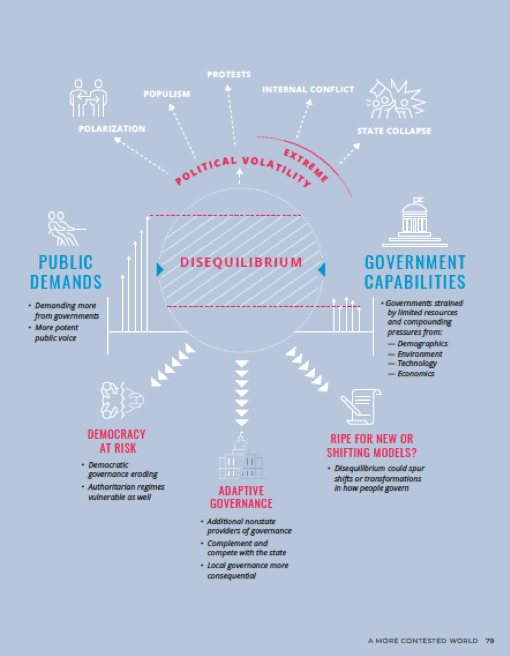
Published on April 22, 2021 / Leer en español
In This Issue
This week, Rosanna Torres takes a look at how Puerto Rico has fared in Washington, D.C. during the first one hundred days of the Biden Administration. Sergio Marxuach then takes a look at some of the lessons we can draw from the international experience restructuring electricity markets.
Our Data Snapshot this week focuses on the U.S. National Intelligence Council’s forecast of an era of state tension, turbulence, and transformation, as the gap between public demands and state capabilities expands.
Finally, On Our Radar takes a brief look at the unfinished business of the U.S. Civil War; the new Global Trends 2040 report published by the U.S. government; and the proposals to reform the Texas electricity market.
Insights + Analysis from CNE

First Impressions Matter
By Rosanna Torres – Director, Washington D.C. Office
In Washington D.C., the symbolic deadline for a new President to make a lasting imprint on the nation is exactly 100 days. After all, first impressions matter. As the Administration and the new Congress near their 100-day mark respectively Puerto Rico has, for better or worse, not been lost in the mix of national priorities.

Beyond LUMA: Some Lessons from the International Experience Restructuring Electricity Markets
By Sergio M. Marxuach – Policy Director
The agreement between the Puerto Rico Electric Power Authority (“PREPA”) and LUMA Energy for the operation and management of Puerto Rico’s electric grid has been in the public spotlight recently. Many private sector organizations, as well as multiple NGOs, have pointed out the deficiencies of that agreement. Yet, canceling or terminating the agreement with LUMA, by itself, will not solve Puerto Rico’s electricity problems. The fact is that PREPA is a highly inefficient electricity company and its operations have a material adverse effect on the Puerto Rican economy. Therefore, the restructuring of Puerto Rico’s electricity market is inevitable to jumpstart endogenous economic growth.
Yet, the final decision as to how to restructure Puerto Rico’s electricity market will be a function of the interplay among and between different economic and political interests. There is no single, one-size-fits-all, solution for every jurisdiction. Indeed, economies with different institutional endowments have developed different solutions, notably when it comes to the forms of asset ownership in the electric industry, and some have been considerably more successful than others. What, then, are some of the lessons we can draw from the international experience with the restructuring of electricity markets?
Data Snapshot
The Growing Gap Between Public Demands and State Capabilities

Source: Global Trends 2040: A More Contested World, U.S. National Intelligence Council
The U.S. National Intelligence Council forecasts an era of state tension, turbulence, and transformation, as the gap between public demands and state capabilities expands:
- “Governments in all regions will face mounting pressures from economic constraints and a mix of demographic, environmental, and other challenges. Meanwhile, populations will demand more, and they are empowered to push for their conflicting goals and priorities.
- The relationships between societies and their governments are likely to face persistent tensions because of a growing mismatch between what publics expect and what governments deliver. This widening gap portends more political volatility, risks for democracy, and expanding roles for alternative sources of governance.
- Growing public discontent, if accompanied by a catalyzing crisis and inspired leadership, could spur significant shifts or transformations in how people govern.”
Team Spotlight
CNE’s work is driven by extraordinary individuals who help Puerto Rico design a path for sustainable economic growth. We want you to meet the people that are part of the CNE Team. In this section, we provide a glimpse of what motivates and fires our work every day.

On Our Radar...
![]() The Unfinished Business of the U.S. Civil War – David W. Blight, professor of history at Yale and scholar of the U.S. Civil War, takes a look at issues of justice, power, and the “Civil War’s unfinished business” in this piece for Foreign Affairs. According to Professor Blight, “Today, Americans are polarized in a cold civil war. Many core questions of the Civil War and the Reconstruction era remain unresolved: Who is an American? What is equality, and how should it be established and protected? What is the proper relationship between states and the federal government? What is the role of government in shaping society? Is federalism a strength or a weakness?”
The Unfinished Business of the U.S. Civil War – David W. Blight, professor of history at Yale and scholar of the U.S. Civil War, takes a look at issues of justice, power, and the “Civil War’s unfinished business” in this piece for Foreign Affairs. According to Professor Blight, “Today, Americans are polarized in a cold civil war. Many core questions of the Civil War and the Reconstruction era remain unresolved: Who is an American? What is equality, and how should it be established and protected? What is the proper relationship between states and the federal government? What is the role of government in shaping society? Is federalism a strength or a weakness?”
![]() Global Trends – The U.S. National Intelligence Council has just published the latest version of Global Trends, a document prepared every four years to assess “the key trends and uncertainties that will shape the strategic environment for the United States during the next two decades.” The analysis, which counts with the input of all 18 U.S. intelligence agencies, various thinks tanks, and several academics, is divided into three sections: (1) structural forces shaping four core areas: demographics, the environment, economics, and technology; (2) emerging dynamics, which examines how these forces interact and intersect at three levels: individuals and society; states; and the international system; and (3) future scenarios for the world in 2040, which explore “various combinations of how the structural forces, emerging dynamics, and key uncertainties could play out.”
Global Trends – The U.S. National Intelligence Council has just published the latest version of Global Trends, a document prepared every four years to assess “the key trends and uncertainties that will shape the strategic environment for the United States during the next two decades.” The analysis, which counts with the input of all 18 U.S. intelligence agencies, various thinks tanks, and several academics, is divided into three sections: (1) structural forces shaping four core areas: demographics, the environment, economics, and technology; (2) emerging dynamics, which examines how these forces interact and intersect at three levels: individuals and society; states; and the international system; and (3) future scenarios for the world in 2040, which explore “various combinations of how the structural forces, emerging dynamics, and key uncertainties could play out.”
![]() Texas Electricity Market – “Two months after blackouts paralyzed Texas, most of the people who participate in the state’s 19-year-old electricity market, including producers, sellers and traders, share a similar view. The freeze wasn’t a one-off event. The state’s power market needs to change”, report Katherine Blunt and Russell Gold for the Wall Street Journal.
Texas Electricity Market – “Two months after blackouts paralyzed Texas, most of the people who participate in the state’s 19-year-old electricity market, including producers, sellers and traders, share a similar view. The freeze wasn’t a one-off event. The state’s power market needs to change”, report Katherine Blunt and Russell Gold for the Wall Street Journal.
